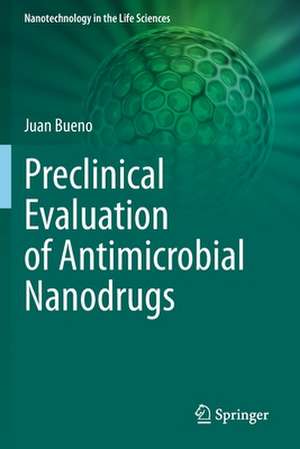Preclinical Evaluation of Antimicrobial Nanodrugs: Nanotechnology in the Life Sciences
Autor Juan Buenoen Limba Engleză Paperback – 9 mai 2021
| Toate formatele și edițiile | Preț | Express |
|---|---|---|
| Paperback (1) | 706.77 lei 6-8 săpt. | |
| Springer International Publishing – 9 mai 2021 | 706.77 lei 6-8 săpt. | |
| Hardback (1) | 713.54 lei 6-8 săpt. | |
| Springer International Publishing – 9 mai 2020 | 713.54 lei 6-8 săpt. |
Din seria Nanotechnology in the Life Sciences
- 20%
 Preț: 938.72 lei
Preț: 938.72 lei - 18%
 Preț: 1119.71 lei
Preț: 1119.71 lei - 18%
 Preț: 946.21 lei
Preț: 946.21 lei - 18%
 Preț: 1029.58 lei
Preț: 1029.58 lei - 18%
 Preț: 1012.70 lei
Preț: 1012.70 lei - 18%
 Preț: 1123.19 lei
Preț: 1123.19 lei - 5%
 Preț: 1169.22 lei
Preț: 1169.22 lei - 18%
 Preț: 954.62 lei
Preț: 954.62 lei - 18%
 Preț: 1121.94 lei
Preț: 1121.94 lei - 18%
 Preț: 1132.98 lei
Preț: 1132.98 lei - 18%
 Preț: 952.89 lei
Preț: 952.89 lei - 18%
 Preț: 944.99 lei
Preț: 944.99 lei - 15%
 Preț: 642.83 lei
Preț: 642.83 lei - 18%
 Preț: 1117.99 lei
Preț: 1117.99 lei - 18%
 Preț: 1105.37 lei
Preț: 1105.37 lei - 18%
 Preț: 954.45 lei
Preț: 954.45 lei - 18%
 Preț: 1117.82 lei
Preț: 1117.82 lei - 18%
 Preț: 959.04 lei
Preț: 959.04 lei - 18%
 Preț: 1111.85 lei
Preț: 1111.85 lei - 24%
 Preț: 901.55 lei
Preț: 901.55 lei - 18%
 Preț: 1007.49 lei
Preț: 1007.49 lei - 20%
 Preț: 587.03 lei
Preț: 587.03 lei - 18%
 Preț: 950.52 lei
Preț: 950.52 lei - 18%
 Preț: 1013.65 lei
Preț: 1013.65 lei - 18%
 Preț: 1657.65 lei
Preț: 1657.65 lei - 18%
 Preț: 1112.15 lei
Preț: 1112.15 lei - 15%
 Preț: 653.33 lei
Preț: 653.33 lei - 18%
 Preț: 1125.55 lei
Preț: 1125.55 lei - 18%
 Preț: 1119.87 lei
Preț: 1119.87 lei
Preț: 706.77 lei
Preț vechi: 743.97 lei
-5% Nou
Puncte Express: 1060
Preț estimativ în valută:
135.26€ • 146.87$ • 113.62£
135.26€ • 146.87$ • 113.62£
Carte tipărită la comandă
Livrare economică 23 aprilie-07 mai
Preluare comenzi: 021 569.72.76
Specificații
ISBN-13: 9783030438579
ISBN-10: 3030438570
Ilustrații: XI, 117 p. 25 illus., 24 illus. in color.
Dimensiuni: 155 x 235 mm
Greutate: 0.2 kg
Ediția:1st ed. 2020
Editura: Springer International Publishing
Colecția Springer
Seria Nanotechnology in the Life Sciences
Locul publicării:Cham, Switzerland
ISBN-10: 3030438570
Ilustrații: XI, 117 p. 25 illus., 24 illus. in color.
Dimensiuni: 155 x 235 mm
Greutate: 0.2 kg
Ediția:1st ed. 2020
Editura: Springer International Publishing
Colecția Springer
Seria Nanotechnology in the Life Sciences
Locul publicării:Cham, Switzerland
Cuprins
Preface.- 1. Antimicrobial screening, foundations and interpretation.- 2. Antimicrobial activity of nanomaterials, from selection to application.- 3. Synergy and antagonism, the criteria of the formulation.- 4. In vitro Nanotoxicity, towards the development of safe and effective treatments.- 5. ADMETox, bringing nanotechnology closer to Lipinski's rule of five.- 6. Antimicrobial nanotechnology in preventing the transmission of infectious disease.- 7. Nanotechnology in the discovery of new antimicrobial drugs: is a new scientific revolution possible?.- 8. Nanotechnology beyond the antibiosis.- Index.
Notă biografică
Dr. Bueno is currently 'Chief Scientific Officer' of Research Center of Bioprospecting and Biotechnology for Biodiversity Foundation (BIOLABB). Researcher in Bioprospecting development and consulting. Doctor in medicine from Caldas University, Manizales, Colombia (2001). Master degree in biomedical sciences from Antioquia University, Medellín, Colombia (2008). Expert in design and implementation of antimicrobial platforms for to evaluate natural products and synthesis drugs with the aim of optimize in vitro antimicrobial activity selection of new chemical entities for future anti infective pharmaceutical, Bogotá, Colombia. Fellow, COLCIENCIAS-Universidad de Caldas (2002). Fellow of University of the United Nations in antifungal susceptibility testing, Instituto Nacional de Enfermedades Infecciosas, INEI.ANLIS, Buenos Aires, Argentina (2004). Fellow, International Visitor Leadership Program on “Public Health”, United States Department of State, Bureau of Educational and Cultural Affairs (2012), 2221 KONUK VEYA AKADEMİK İZİNLİ (SABBATİCAL) BİLİM İNSANI DESTEKLEME PROGRAMI (2015). Award of Colombian Dermatology Association, Best research in dermatology (2006). Enrique Nuñez Olarte award for pharmacological research. Colombian Pharmacology Association (2009). Author of 50 articles in pharmacological research. Author in 13 chapter books in antimicrobial drug discovery and bioprospecting as well as the book titled 'MOLECULAR EVOLUTIONARY MODELS IN DRUG DISCOVERY'.
Textul de pe ultima copertă
Translational medicine addresses the gap between research and the clinical application of new discoveries. To efficiently deliver new drugs to care centers, a preclinical evaluation, both in vitro and in vivo, is required to ensure that the most active and least toxic compounds are selected as well as to predict clinical outcome.
Antimicrobial nanomedicines have been shown to have higher specificity in their therapeutic targets and the ability to serve as adjuvants, increasing the effectiveness of pre-existing immune compounds. The design and development of new standardized protocols for evaluating antimicrobial nanomedicines is needed for both the industry and clinical laboratory. These protocols must aim to evaluate laboratory activity and present models of pharmacokinetic-pharmacodynamic and toxicokinetic behavior that predict absorption and distribution. Likewise, these protocols must follow a theranostics approach, be able to detect promising formulations, diagnose the infectious disease, and determine the correct treatment to implement a personalized therapeutic behavior. Given the possibilities that nanotechnology offers, not updating to new screening platforms is inadequate as it prevents the correct application of discoveries, increasing the effect of the valley of death between innovations and their use.
This book is structured to discuss the fundamentals taken into account for the design of robust, reproducible and automatable evaluation platforms. These vital platforms should enable the discovery of new medicines with which to face antimicrobial resistance (RAM), one of the great problems of our time.
Caracteristici
Comprehensive discussion of antimicrobial nanomedicines Explanation of protocols in the design of robust, reproducible and automatable evaluation platforms Fully referenced with the latest technology and research results
